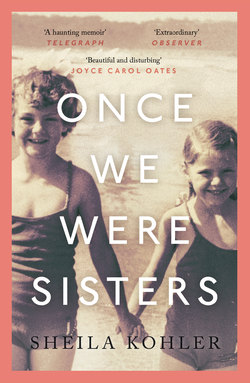Читать книгу Once We Were Sisters - Sheila Kohler - Страница 14
На сайте Литреса книга снята с продажи.
ОглавлениеV
TOKOLOSH
MOTHER LIVES THE LAZY LIFE OF THE PRIVILEGED WHITE woman in apartheid South Africa. She spends her mornings sipping tea, dressing up. She sallies forth in her flowered hat, gloves, and high heels to visit friends or to shop in Rose-bank, a suburb of Johannesburg. She spends our father’s hard-earned money. He, twenty years older than her, does not seem to mind, though from time to time he says, “Money does not grow on trees,” and appears briefly in the evenings, going through the garden turning off taps.
Mother buys innumerable pastel dresses, leghorn hats with flowers, and pale kid gloves with buttons up to the elbow for herself, for her two sisters, her friends. She buys shoes; she has many pairs of small, delicate, expensive European shoes.
She and her sisters are proud of their small hands and feet, their soft dark curls, their hazel eyes. Appearances are most important; they are what has enabled her to advance: the clothes, the figure, the face. “Clothes maketh the man,” she says. Sometimes, unexpectedly, though she cannot spell, she quotes Shakespeare.
She has the nanny dress us up in smocked dresses, organdy sunsuits with little sleeves like wings, white socks, and shoes.
Above all, Mother sleeps. She grasps sleep greedily in her clenched fists, as though it were the most precious thing in the world. She sleeps all through the long hot afternoons in the green light of her high-ceilinged room with the shutters drawn down, one arm flung with abandon across her face, her dark curls clinging to her damp forehead.
And she drinks. She starts drinking at sundown on the glassed-in veranda, surrounded by her two sisters and younger brother, while the blue hills disappear in the dim light.
Holding up her empty crystal glass, Mother says, “Will you get me the other half, Pie?” Pie, the eldest of her three sisters, who is two years older than my mother and a little taller, jumps up obediently to bring Mother another drink and after that, another one.
We learn there are many “other halves,” in this whole, as many as she desires. None of her family, who are all dependent on her and my father’s money, will even try to stop her. Her two sisters do her bidding.
She is the middle one, the one they call Bill, because she was a tomboy. She is the lucky one, she says, the only one who has married a wealthy man, a hardworking timber merchant. There is a brother, too, whom they call Proie, but he does not seem to count or amount to much.
It is a world of women who obey Mother.
“I have to wee,” Mother says to my Aunt Pie, whose real name is Dorothy, but whom she calls Pie, perhaps a shortened form of Sweetie Pie.
“That’s one thing I can’t do for you,” Pie says with a thin smile.
Occasionally the youngest one of our aunts, Hazel, the one who is considered the cleverest, who has worked for a while as some sort of secretary, who knows how to spell, dares to say what she thinks.
As my sister and I are sitting in the back of Mother’s Jaguar, and she prepares to drive us home after a party, Aunt Hazel puts her head in the car window and says, “You shouldn’t drive with children in the car in the state you are in, Bill!” Mother purses her lips with disgust. “How can she talk to me like that?” Mother says, driving off, weaving slowly, dangerously, down the road.
“Light me a cigarette, Pet,” Mother says, and I am obliged to climb forward and push in the cigarette lighter to light up her Craven A, which makes me feel sick.
Sometimes Mother changes. We do not understand what has happened to her. It is one of Mother’s secrets, of the many mysteries that surround her.
She becomes strange. Gradually she draws away from us into her own foreign world. We watch with increasing terror as her face alters: her mouth becomes thin, turns down at the corners; her words are slurred and almost unintelligible. She speaks another thick thorny language, difficult to pronounce; her gestures alter; she staggers; she walks stiffly in an attempt at a straight line.
We fear a witch has come and taken Mother’s place, and we are not sure Mother will come back to us. This could happen to anyone, this terrifying metamorphosis. Worst of all, we fear this could happen to us.
Once, lying side by side in our beds in the dark, we see a light glimmering in the big bay window in the nursery.
“It’s the Tokolosh,” I say. I am certain an evil spirit, what the Zulus call the Tokolosh, has come for us, to take us away. We lie still, unable to move, to call out.
Our nanny teaches us to kneel by our beds, press our hands together, and pray:
Matthew, Mark, Luke, and John,Bless the bed that I lie on.Four corners to my bed,Four angels ’round my head;One to watch and one to prayAnd two to bear my soul away.
